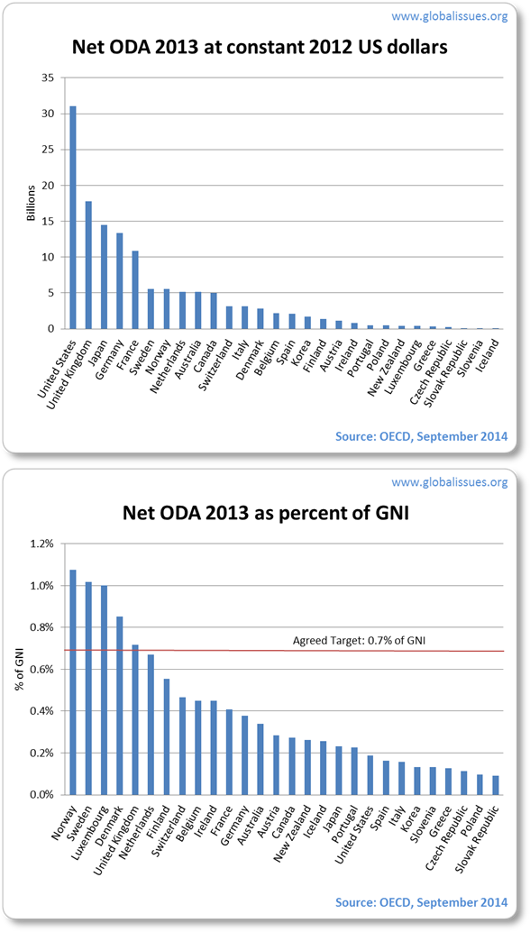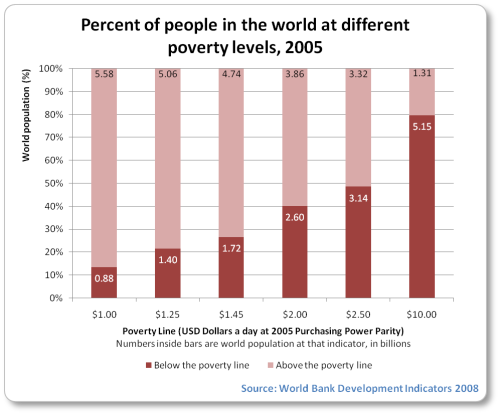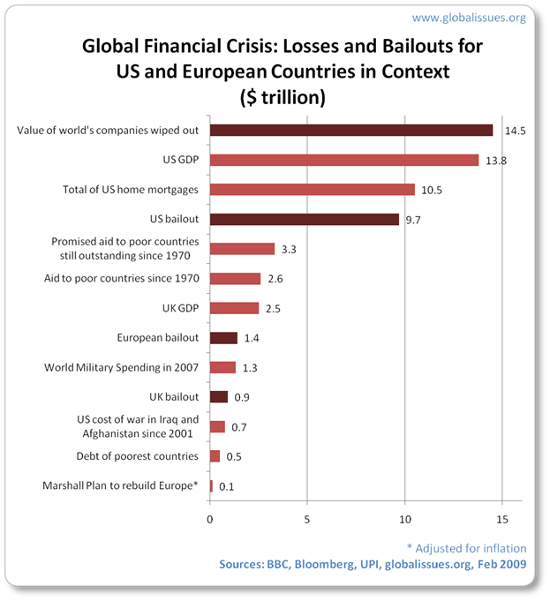Today, around 21,000 children died around the world. This daily tragedy, from poverty and other preventable causes, rarely makes headline news.
Latest world news
World
Explainer: Why GLOFS Are Growing Concern in the Himalaya
- Inter Press Service

KATHMANDU, May 28 (IPS) - In this explainer, IPS looks at GLOFs and the danger they pose to communities when many of the 54,000 glaciers in the Hindu Kush Himalaya (HKH) region are getting smaller due to climate change.
Phu Chhettar Sherpa, who worked as an icefall doctor (a Sherpa who fixes ropes for climbers) for seven years from 2015 to 2021 on Mt. Everest, vividly recalls his fear of possible flash floods after the huge earthquake in Nepal in 2015.
There can be No Special Status for Public Officials
- Inter Press Service

BERLIN, Germany, May 28 (IPS) - In an interview with Herta Däubler-Gmelin who served as Federal Minister of Justice from 1998 to 2002, and as a Member of the German Bundestag from 1972 to 2009. The chief prosecutor of the International Criminal Court (ICC), Karim Khan, last week requested arrest warrants for three Hamas leaders as well as for Israeli Prime Minister Benjamin Netanyahu and his Defence Minister Yoav Galant. They are accused of various war crimes and crimes against humanity. But what does this mean and where do things go from here?
UN supports Papua New Guinea following deadly landslide
- UN News
The United Nations continues to assist authorities in Papua New Guinea (PNG) with search and rescue efforts four days after the massive landslide in Enga province, where some 2,000 people are feared dead and accessing survivors remains a challenge.
UN hub reaches remote Pacific islanders: A UN Resident Coordinator blog
- UN News

The communities of thousands of tiny Pacific islands are the frontline gamechangers tackling the climate crisis, and a hub based in Micronesia now hosts more than a dozen UN agencies that together are helping address some of their most pressing needs as they battle existential threats like rising sea levels.
Deep concerns over ‘inhuman’ detention of Gazans by Israeli authorities
- UN News
Amid further reported bombardment of Gaza overnight into Tuesday, UN and partner organizations have expressed deep concern over the “inhuman” detention of suspected Palestinian fighters in the enclave by Israeli authorities, alleging treatment so poor that some had to have limbs amputated “due to prolonged shackling”.
Small Island Nations Demand Urgent Global Action at SIDS4 Conference
- Inter Press Service

ANTIGUA, May 27 (IPS) - The once-in-a-decade SIDS Conference opened in Antigua and Barbuda today, with a clear message: the world already knows the challenges that SIDS face—now it’s time for action.“This year has been the hottest in history in practically every corner of the globe, foretelling severe impacts on our ecosystems and starkly underscoring the urgency of our predicament. We are gathered here not merely to reiterate our challenges, but to demand and enact solutions,” declared Antigua and Barbuda Prime Minister Gaston Brown at the opening of the Fourth International Conference on Small Island Developing States on May 27.
Impressionism Festival Taps Into Global Concerns
- Inter Press Service

NORMANDY, France, May 27 (IPS) - On a clear, chilly evening, the words of African American poet Maya Angelou filled the air in the centre of Rouen, as a vivid light show played across the façade of the French town’s imposing cathedral, and as a bright full moon rose in the sky.
Explainer: Understanding Carbon Trading and its Rationale
- Inter Press Service

NAIROBI, May 27 (IPS) - Carbon trading has gained growing popularity on the African continent and is considered by many governments as a viable way to achieve their climate targets while building communities. IPS takes a look at what's behind the carbon market.
Veteran Human Rights Leader Has Seen Enough: Israel Perpetrating Genocide in Gaza
- Inter Press Service

NEW YORK, May 27 (IPS) - A widely respected humanitarian law expert who has resisted using the term "genocide" for Israel's killing of tens of thousands of Palestinians in Gaza—a word used "sparingly" in the international human rights movement, he noted—said he has concluded a genocide is indeed taking place, evidenced particularly by Israel's blocking of humanitarian aid.
Malawi Moves To Regulate Carbon Trading Amid Transparency Concerns in Global Market
- Inter Press Service

BLANTYRE, Malawi, May 27 (IPS) - Malawi is increasingly pitching carbon trading as a source of revenue it needs to bolster the economy, which is suffering from foreign exchange shortages caused by a large trade imbalance and being buffeted by several shocks, including the climate crisis.
- More stories…
Climate
Explainer: Why GLOFS Are Growing Concern in the Himalaya
- Inter Press Service

KATHMANDU, May 28 (IPS) - In this explainer, IPS looks at GLOFs and the danger they pose to communities when many of the 54,000 glaciers in the Hindu Kush Himalaya (HKH) region are getting smaller due to climate change.
Phu Chhettar Sherpa, who worked as an icefall doctor (a Sherpa who fixes ropes for climbers) for seven years from 2015 to 2021 on Mt. Everest, vividly recalls his fear of possible flash floods after the huge earthquake in Nepal in 2015.
UN hub reaches remote Pacific islanders: A UN Resident Coordinator blog
- UN News

The communities of thousands of tiny Pacific islands are the frontline gamechangers tackling the climate crisis, and a hub based in Micronesia now hosts more than a dozen UN agencies that together are helping address some of their most pressing needs as they battle existential threats like rising sea levels.
Small Island Nations Demand Urgent Global Action at SIDS4 Conference
- Inter Press Service

ANTIGUA, May 27 (IPS) - The once-in-a-decade SIDS Conference opened in Antigua and Barbuda today, with a clear message: the world already knows the challenges that SIDS face—now it’s time for action.“This year has been the hottest in history in practically every corner of the globe, foretelling severe impacts on our ecosystems and starkly underscoring the urgency of our predicament. We are gathered here not merely to reiterate our challenges, but to demand and enact solutions,” declared Antigua and Barbuda Prime Minister Gaston Brown at the opening of the Fourth International Conference on Small Island Developing States on May 27.
Impressionism Festival Taps Into Global Concerns
- Inter Press Service

NORMANDY, France, May 27 (IPS) - On a clear, chilly evening, the words of African American poet Maya Angelou filled the air in the centre of Rouen, as a vivid light show played across the façade of the French town’s imposing cathedral, and as a bright full moon rose in the sky.
Explainer: Understanding Carbon Trading and its Rationale
- Inter Press Service

NAIROBI, May 27 (IPS) - Carbon trading has gained growing popularity on the African continent and is considered by many governments as a viable way to achieve their climate targets while building communities. IPS takes a look at what's behind the carbon market.
Malawi Moves To Regulate Carbon Trading Amid Transparency Concerns in Global Market
- Inter Press Service

BLANTYRE, Malawi, May 27 (IPS) - Malawi is increasingly pitching carbon trading as a source of revenue it needs to bolster the economy, which is suffering from foreign exchange shortages caused by a large trade imbalance and being buffeted by several shocks, including the climate crisis.
UPDATING LIVE: Small island States meet in Antigua and Barbuda charting new course to sustainable prosperity
- UN News

Good morning from the blue waters and lush green hills of the Caribbean. We’re reporting live from the high level opening of the Fourth International Conference on Small Island Developing States (SIDS4) on the beautiful twin island nation of Antigua and Barbuda.
Countdown to Critical Conference for Small Island Developing States
- Inter Press Service

SAINT LUCIA, May 26 (IPS) - The International Conference on Small Island Developing States convenes every 10 years, with the upcoming SIDS4 event scheduled for Antigua and Barbuda. As the world’s 39 SIDS prepare to chart their survival in the face of climate change, IPS is on- the-ground coverage of the event.Delegates from small island developing states (SIDS) worldwide are meeting in Antigua and Barbuda to strategize for the next decade.
In Antigua, island youth build ‘wall of commitment’ to turn tide against climate crisis
- UN News

It may be built out of recyclable cardboard boxes, but when world leaders officially open the Fourth International Conference on Small Island Developing States (SIDS4) on Monday, one of the manifestations of young people’s hopes for a better future that will greet them is a solid “wall of commitment” imploring them to take more action against the ravages of climate change.
WMO warns of up to seven major hurricanes in North Atlantic in 2024
- UN News

The UN World Meteorological Organization (WMO) has issued a warning for an “above average” hurricane season in the North Atlantic in 2024. Based on data from the US National Oceanic and Atmospheric Administration (NOAA), this would mark the ninth consecutive year of anomalies.
- More stories…
Health
COVID-19 eliminated a decade of progress in global level of life expectancy
- UN News

Data crunched by the UN World Health Organization (WHO) has revealed that the COVID-19 emergency reversed more than a decade of gains in life expectancyreinforcing the need for countries to agree on a global pandemic treaty to protect future generations.
WHO report reveals major health disparities between European teens
- UN News

A report published on Thursday from the World Health Organization’s (WHO) European region has revealed alarming health disparities in young people, especially those from less affluent families, representing a “vicious cycle of disadvantage”.
International Community Urged to End Impunity for Violence Against Healthcare in Conflicts
- Inter Press Service

BRATISLAVA, May 22 (IPS) - Governments and international agencies must do more to end impunity for violence against healthcare, campaigners have urged, as a new report shows that attacks on healthcare during conflicts reached a new high last year.
Stories from the UN Archive: Magic suitcases for 1960s midwives
- UN News

Can a magic suitcase save lives?
‘Critical gaps’ in understanding climate change fuel tropical disease spread
- UN News

A comprehensive review by the UN health agency has revealed critical gaps in understanding the full impact of climate change on malaria, dengue, trachoma and other tropical diseases.
WHO reports major increase in sexually transmitted infections
- UN News

Sexually transmitted infections (STIs) such as syphilis are on the rise in most regions of the world, UN health agency WHO said in a new report on Tuesday.
Syria: WHO Regional Director calls for greater investment in health sector
- UN News

Failure to invest in the health of the Syrian people will only deepen instability in the war-ravaged country and pose threats to regional and global security, a senior official with the World Health Organization (WHO) has said.
Rising Temperatures Drive Human-Wildlife Conflict in Zimbabwe
- Inter Press Service

BULAWAYO, Zimbabwe, May 17 (IPS) - Rising temperatures are being blamed for an increase in human-wildlife conflicts in Zimbabwe as animals such as snakes leave their natural habitat earlier than usual.
Afghan Women Struggle with Soaring Mental Health Issues
- Inter Press Service

May 16 (IPS) - Afghanistan is grappling with a growing crisis of mental illness, particularly among its women, as highlighted in a United Nations report. Officials from the mental health department at Herat regional hospital have observed a concerning uptick in the number of women afflicted by psychological disorders in the province.
SBSTTA and SBIBiodiversity Meetings Crucial for the Global South Begin
- Inter Press Service

NAIROBI, May 14 (IPS) - The 26th meeting of the Subsidiary Body of Scientific, Technical, and Technological Advisors (SBSTTA) of the United Nations Convention on Biological Diversity (UNCBD) started in Nairobi, Kenya, on Monday. Over 1,400 delegates, including 600 representing signatories or parties from over 150 countries, are present for the seven-day meeting at the headquarters of the United Nations Environment Programme (UNEP). A large number of members from Indigenous Peoples and other observer organizations, including women’s groups, are also attending the meetings.
- More stories…
Economy
UN hub reaches remote Pacific islanders: A UN Resident Coordinator blog
- UN News

The communities of thousands of tiny Pacific islands are the frontline gamechangers tackling the climate crisis, and a hub based in Micronesia now hosts more than a dozen UN agencies that together are helping address some of their most pressing needs as they battle existential threats like rising sea levels.
Small Island Nations Demand Urgent Global Action at SIDS4 Conference
- Inter Press Service

ANTIGUA, May 27 (IPS) - The once-in-a-decade SIDS Conference opened in Antigua and Barbuda today, with a clear message: the world already knows the challenges that SIDS face—now it’s time for action.“This year has been the hottest in history in practically every corner of the globe, foretelling severe impacts on our ecosystems and starkly underscoring the urgency of our predicament. We are gathered here not merely to reiterate our challenges, but to demand and enact solutions,” declared Antigua and Barbuda Prime Minister Gaston Brown at the opening of the Fourth International Conference on Small Island Developing States on May 27.
UPDATING LIVE: Small island States meet in Antigua and Barbuda charting new course to sustainable prosperity
- UN News

Good morning from the blue waters and lush green hills of the Caribbean. We’re reporting live from the high level opening of the Fourth International Conference on Small Island Developing States (SIDS4) on the beautiful twin island nation of Antigua and Barbuda.
In Antigua, island youth build ‘wall of commitment’ to turn tide against climate crisis
- UN News

It may be built out of recyclable cardboard boxes, but when world leaders officially open the Fourth International Conference on Small Island Developing States (SIDS4) on Monday, one of the manifestations of young people’s hopes for a better future that will greet them is a solid “wall of commitment” imploring them to take more action against the ravages of climate change.
North Macedonia Turns Back the Clock
- Inter Press Service

LONDON, May 23 (IPS) - The old guard is back in North Macedonia, as the former ruling party – the Internal Macedonian Revolutionary Organization – Democratic Party for Macedonian National Unity (VMRO-DPMNE) – returns to parliamentary and presidential power.
‘All hands on deck’ in Antigua and Barbuda as small island States chart course to resilient prosperity
- UN News

Leaders from small island developing States worldwide will converge on the shores of Antigua and Barbuda in the Caribbean this weekend to deliver a bold new plan of action to build resilience on the road to the 2030 Sustainable Development Goals (SDGs).
Small Island Developing States can be Nature-Positive Leaders for the World
- Inter Press Service

UNITED NATIONS, May 22 (IPS) - Small island developing states (SIDS) are scattered across the globe, dotting the Pacific Ocean, the Caribbean, the west and east coasts of Africa and the Indian Ocean.
Panama’s Elections: Has Impunity Prevailed?
- Inter Press Service

MONTEVIDEO, Uruguay, May 21 (IPS) - Regional experts called it Panama’s most important election since the 1989 US invasion that deposed de facto president General Manuel Noriega. Panamanians went to the polls amid high inflation and unemployment, with a stagnating economy. Endemic corruption was also high on their long list of concerns, along with access to water, education and a collapsing social security system.
INTERVIEW: Developing countries risk missing out on net-zero benefits, but fairer future is possible
- UN News

Inflation fears are subsiding, the “net-zero transition” to a clean economy could spell good news with the right policies in place, and we are still dealing with a “COVID hangover”, according to the UN Department for Economic and Social Affairs (DESA).
More Diversified Trade Can Make Middle East & Central Asia More Resilient
- Inter Press Service

WASHINGTON DC, May 17 (IPS) - Dislocations from the pandemic, geoeconomic fragmentation, and Russia’s war in Ukraine have shifted world trade dynamics. While this has created challenges, the redirection of trade has also generated new opportunities, particularly for the Caucasus and Central Asia.
- More stories…
More news topics
Read more news stories by
More news by World, Economy, Environment, Geopolitics, Health, Human Rights, More news topics …
World news powered by and
and 
Issues in depth
Latest
Action on climate change is cheaper than inaction
Many are afraid that tackling climate change is going to be too costly. But increasingly, studies are showing action will not just be cheaper than inaction, but could actually result in economic, environmental and even health benefits, while improving sustainability.
Read “Action on climate change is cheaper than inaction” to learn more.
Climate Change and Global Warming Introduction
 The climate is changing. The earth is warming up, and there is now overwhelming scientific consensus that it is happening, and human-induced. With global warming on the increase and species and their habitats on the decrease, chances for ecosystems to adapt naturally are diminishing.
The climate is changing. The earth is warming up, and there is now overwhelming scientific consensus that it is happening, and human-induced. With global warming on the increase and species and their habitats on the decrease, chances for ecosystems to adapt naturally are diminishing.
Many are agreed that climate change may be one of the greatest threats facing the planet. Recent years show increasing temperatures in various regions, and/or increasing extremities in weather patterns.
This section looks at what causes climate change, what the impacts are and where scientific consensus currently is.
Read “Climate Change and Global Warming Introduction” to learn more.
COP20—Lima Climate Conference
 An overview of the Climate Change Conference (also known as COP 20), held in Lima, Peru in December 2014.
An overview of the Climate Change Conference (also known as COP 20), held in Lima, Peru in December 2014.
While it seemed like it was a successful meeting, because developing nations were committed to drawing up their own plans for emissions reductions for the first time, a number of important issues were left undecided such as how financing would work.
This page is an overview of the Lima Climate conference.
Read “COP20—Lima Climate Conference” to learn more.
Ebola Outbreak in West Africa
An overview of the Ebola virus outbreak in West Africa that has been described by the World Health Organization as the largest, most severe and most complex outbreak in the history of the disease.
The epidemic began at the end of 2013, in Guinea. From there it spread to Liberia, Sierra Leone, Nigeria and Senegal. Many of the affected countries face enormous challenges in stopping its spread and providing care for all patients.
Thousands of people have died and many are at risk as the fatality rate from this virus is very high. As the crisis worsens, as well as the enormous health challenges involved, the social and economic consequences may set these countries back, reversing some gains a number of these countries have made in recent years.
Read “Ebola Outbreak in West Africa” to learn more.
Foreign Aid for Development Assistance
In 1970, the world’s rich countries agreed to give 0.7% of their gross national income as official international development aid, annually.
Since that time, billions have certainly been given each year, but rarely have the rich nations actually met their promised target.
For example, the US is often the largest donor in dollar terms, but ranks amongst the lowest in terms of meeting the stated 0.7% target.
Furthermore, aid has often come with a price of its own for the developing nations. Common criticisms, for many years, of foreign aid, have included the following:
- Aid is often wasted on conditions that the recipient must use overpriced goods and services from donor countries
- Most aid does not actually go to the poorest who would need it the most
- Aid amounts are dwarfed by rich country protectionism that denies market access for poor country products while rich nations use aid as a lever to open poor country markets to their products
- Large projects or massive grand strategies often fail to help the vulnerable; money can often be embezzled away.
This article explores who has benefited most from this aid, the recipients or the donors.
Read “Foreign Aid for Development Assistance” to learn more.
Nature and Animal Conservation
 Preserving species and their habitats is important for ecosystems to self-sustain themselves.
Preserving species and their habitats is important for ecosystems to self-sustain themselves.
Yet, the pressures to destroy habitat for logging, illegal hunting, and other challenges are making conservation a struggle.
Read “Nature and Animal Conservation” to learn more.
Most Popular
Poverty Facts and Stats
Most of humanity lives on just a few dollars a day. Whether you live in the wealthiest nations in the world or the poorest, you will see high levels of inequality.
The poorest people will also have less access to health, education and other services. Problems of hunger, malnutrition and disease afflict the poorest in society. The poorest are also typically marginalized from society and have little representation or voice in public and political debates, making it even harder to escape poverty.
By contrast, the wealthier you are, the more likely you are to benefit from economic or political policies. The amount the world spends on military, financial bailouts and other areas that benefit the wealthy, compared to the amount spent to address the daily crisis of poverty and related problems are often staggering.
Some facts and figures on poverty presented in this page are eye-openers, to say the least.
Read “Poverty Facts and Stats” to learn more.
Global Financial Crisis
 Following a period of economic boom, a financial bubble — global in scope — burst, even causing some of the world’s largest financial institutions have collapsed. With the resulting recession, many governments of the wealthiest nations in the world have resorted to extensive bail-out and rescue packages for the remaining large banks and financial institutions while imposing harsh austerity measures on themselves.
Following a period of economic boom, a financial bubble — global in scope — burst, even causing some of the world’s largest financial institutions have collapsed. With the resulting recession, many governments of the wealthiest nations in the world have resorted to extensive bail-out and rescue packages for the remaining large banks and financial institutions while imposing harsh austerity measures on themselves.
Some of the bail-outs have also led to charges of hypocrisy due to the apparent socializing of the costs while privatizing the profits.
Furthermore, the institutions being rescued are typically the ones got the world into this trouble in the first place. For smaller businesses and poorer people, such options for bail out and rescue are rarely available when they find themselves in crisis.
Plummeting stock markets at one point wiped out 33% of the value of companies, $14.5 trillion. Taxpayers bailed out their banks and financial institutions with large amounts of money. US taxpayers alone have spent some $9.7 trillion in bailout packages and plans. The UK and other European countries have also spent some $2 trillion on rescues and bailout packages. More is expected. Much more.
Such numbers, made quickly available, are enough to wipe many individual’s mortgages, or clear out third world debt many times over. Even the high military spending figures are dwarfed by the bailout plans to date.
This problem could have been averted (in theory) as people had been pointing to these issues for decades. However, during boom, very few want to hear such pessimism. Does this crisis spell an end to the careless forms of banking and finance and will it herald a better economic age, or are we just doomed to keep forgetting history and repeat these mistakes in the future? Signs are not encouraging as rich nations are resisting meaningful reform…
Read “Global Financial Crisis” to learn more.
Causes of Poverty
Poverty is the state for the majority of the world’s people and nations. Why is this? Is it enough to blame poor people for their own predicament? Have they been lazy, made poor decisions, and been solely responsible for their plight? What about their governments? Have they pursued policies that actually harm successful development? Such causes of poverty and inequality are no doubt real. But deeper and more global causes of poverty are often less discussed.
Read “Causes of Poverty” to learn more.
Climate Change and Global Warming
 The climate is changing. The earth is warming up, and there is now overwhelming scientific consensus that it is happening, and human-induced. With global warming on the increase and species and their habitats on the decrease, chances for ecosystems to adapt naturally are diminishing. Many are agreed that climate change may be one of the greatest threats facing the planet. Recent years show increasing temperatures in various regions, and/or increasing extremities in weather patterns.
The climate is changing. The earth is warming up, and there is now overwhelming scientific consensus that it is happening, and human-induced. With global warming on the increase and species and their habitats on the decrease, chances for ecosystems to adapt naturally are diminishing. Many are agreed that climate change may be one of the greatest threats facing the planet. Recent years show increasing temperatures in various regions, and/or increasing extremities in weather patterns.
This section explores some of the effects of climate change. It also attempts to provide insights into what governments, companies, international institutions, and other organizations are attempting to do about this issue, as well as the challenges they face. Some of the major conferences in recent years are also discussed.
Read “Climate Change and Global Warming” to learn more.
Environmental Issues
 Environmental issues are also a major global issue. Humans depend on a sustainable and healthy environment, and yet we have damaged the environment in numerous ways. This section introduces other issues including biodiversity, climate change, animal and nature conservation, population, genetically modified food, sustainable development, and more.
Environmental issues are also a major global issue. Humans depend on a sustainable and healthy environment, and yet we have damaged the environment in numerous ways. This section introduces other issues including biodiversity, climate change, animal and nature conservation, population, genetically modified food, sustainable development, and more.
Read “Environmental Issues” to learn more.
Racism
 Racism is the belief that characteristics and abilities can be attributed to people simply on the basis of their race and that some racial groups are superior to others. Racism and discrimination have been used as powerful weapons encouraging fear or hatred of others in times of conflict and war, and even during economic downturns. This article explores racism from around the world.
Racism is the belief that characteristics and abilities can be attributed to people simply on the basis of their race and that some racial groups are superior to others. Racism and discrimination have been used as powerful weapons encouraging fear or hatred of others in times of conflict and war, and even during economic downturns. This article explores racism from around the world.
Read “Racism” to learn more.
Topical
Global Financial Crisis
 Following a period of economic boom, a financial bubble — global in scope — burst, even causing some of the world’s largest financial institutions have collapsed. With the resulting recession, many governments of the wealthiest nations in the world have resorted to extensive bail-out and rescue packages for the remaining large banks and financial institutions while imposing harsh austerity measures on themselves.
Following a period of economic boom, a financial bubble — global in scope — burst, even causing some of the world’s largest financial institutions have collapsed. With the resulting recession, many governments of the wealthiest nations in the world have resorted to extensive bail-out and rescue packages for the remaining large banks and financial institutions while imposing harsh austerity measures on themselves.
Some of the bail-outs have also led to charges of hypocrisy due to the apparent socializing of the costs while privatizing the profits.
Furthermore, the institutions being rescued are typically the ones got the world into this trouble in the first place. For smaller businesses and poorer people, such options for bail out and rescue are rarely available when they find themselves in crisis.
Plummeting stock markets at one point wiped out 33% of the value of companies, $14.5 trillion. Taxpayers bailed out their banks and financial institutions with large amounts of money. US taxpayers alone have spent some $9.7 trillion in bailout packages and plans. The UK and other European countries have also spent some $2 trillion on rescues and bailout packages. More is expected. Much more.
Such numbers, made quickly available, are enough to wipe many individual’s mortgages, or clear out third world debt many times over. Even the high military spending figures are dwarfed by the bailout plans to date.
This problem could have been averted (in theory) as people had been pointing to these issues for decades. However, during boom, very few want to hear such pessimism. Does this crisis spell an end to the careless forms of banking and finance and will it herald a better economic age, or are we just doomed to keep forgetting history and repeat these mistakes in the future? Signs are not encouraging as rich nations are resisting meaningful reform…
Read “Global Financial Crisis” to learn more.
Climate Change and Global Warming
 The climate is changing. The earth is warming up, and there is now overwhelming scientific consensus that it is happening, and human-induced. With global warming on the increase and species and their habitats on the decrease, chances for ecosystems to adapt naturally are diminishing. Many are agreed that climate change may be one of the greatest threats facing the planet. Recent years show increasing temperatures in various regions, and/or increasing extremities in weather patterns.
The climate is changing. The earth is warming up, and there is now overwhelming scientific consensus that it is happening, and human-induced. With global warming on the increase and species and their habitats on the decrease, chances for ecosystems to adapt naturally are diminishing. Many are agreed that climate change may be one of the greatest threats facing the planet. Recent years show increasing temperatures in various regions, and/or increasing extremities in weather patterns.
This section explores some of the effects of climate change. It also attempts to provide insights into what governments, companies, international institutions, and other organizations are attempting to do about this issue, as well as the challenges they face. Some of the major conferences in recent years are also discussed.
Read “Climate Change and Global Warming” to learn more.
Food and Agriculture Issues
 Food and agriculture goes to the heart of our civilizations. Religions, cultures and even modern civilization have food and agriculture at their core. For an issue that goes to the heart of humanity it also has its ugly side.
Food and agriculture goes to the heart of our civilizations. Religions, cultures and even modern civilization have food and agriculture at their core. For an issue that goes to the heart of humanity it also has its ugly side.
This issue explores topics ranging from the global food crisis of 2008, to issues of food aid, world hunger, food dumping and wasteful agriculture such as growing tobacco, sugar, beef, and more.
Read “Food and Agriculture Issues” to learn more.
Foreign Aid for Development Assistance
In 1970, the world’s rich countries agreed to give 0.7% of their gross national income as official international development aid, annually.
Since that time, billions have certainly been given each year, but rarely have the rich nations actually met their promised target.
For example, the US is often the largest donor in dollar terms, but ranks amongst the lowest in terms of meeting the stated 0.7% target.
Furthermore, aid has often come with a price of its own for the developing nations. Common criticisms, for many years, of foreign aid, have included the following:
- Aid is often wasted on conditions that the recipient must use overpriced goods and services from donor countries
- Most aid does not actually go to the poorest who would need it the most
- Aid amounts are dwarfed by rich country protectionism that denies market access for poor country products while rich nations use aid as a lever to open poor country markets to their products
- Large projects or massive grand strategies often fail to help the vulnerable; money can often be embezzled away.
This article explores who has benefited most from this aid, the recipients or the donors.
Read “Foreign Aid for Development Assistance” to learn more.
Tax Avoidance and Tax Havens; Undermining Democracy
 Through tax havens, transfer pricing and many other policies — both legal and illegal — billions of dollars of tax are avoided. The much-needed money would helped developing (and developed) countries provide important social services for their populations.
Through tax havens, transfer pricing and many other policies — both legal and illegal — billions of dollars of tax are avoided. The much-needed money would helped developing (and developed) countries provide important social services for their populations.
Some tax avoidance, regardless of how morally objectionable it may be to some people, is perfectly legal, and the global super elite are able to hide away trillions of dollars, resulting in massive losses of tax revenues for cash-strapped governments who then burden ordinary citizens further with austerity measures during economic crisis, for example. Yet these super elite are often very influential in politics and business. In effect, they are able to undermine democracy and capitalism at the same time.
As the global financial crisis has affected many countries, tackling tax avoidance would help target those more likely to have contributed to the problem while avoid many unnecessary austerity measures that hit the poorest so hard. But despite rhetoric stating otherwise, it does not seem to high on the agenda of many governments as you might think.
Read “Tax Avoidance and Tax Havens; Undermining Democracy” to learn more.
World Military Spending
World military spending had reduced since the Cold War ended, but a few nations such as the US retain high level spending.
In recent years, global military expenditure has increased again and is now comparable to Cold War levels. Recent data shows global spending at over $1.7 trillion. 2012 saw the first dip in spending — only slightly —since 1998, in an otherwise rising trend.
The highest military spender is the US accounting for almost two-fifths of the world’s spending, more than the rest of the G7 (most economically advanced countries) combined, and more than all its potential enemies, combined.
Read “World Military Spending” to learn more.
“If a man is offered a fact which goes against his instincts, he will scrutinize it closely, and unless the evidence is overwhelming, he will refuse to believe it. If, on the other hand, he is offered something which affords a reason for acting in accordance to his instincts, he will accept it even on the slightest evidence.” — Bertrand Russell, Roads to Freedom
 Global Issues
Global Issues


